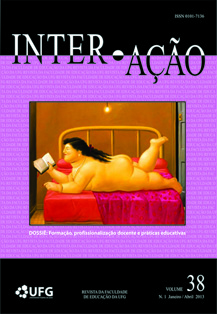LA PROFESIONALIZACIÓN DOCENTE EN LATINOAMÉRICA Y LOS SENTIDOS DISCURSIVOS DEL NEOLIBERALISMO: 1990-2012
DOI:
https://doi.org/10.5216/ia.v38i1.25130Keywords:
neoliberalismo, posneoliberalismo, políticas docentes, profesionalización docente.Abstract
En este artículo se presentan los resultados parciales de una investigación que analiza los sentidos discursivos sobre la profesionalización docente. Se debate acerca de la continuidad ideológica privatista de los organismos internacionales y su relación con algunos países de la región que establecieron mecanismos de profesionalización vinculados al acountability. Metodológicamente se analizan prioritariamente documentos del BM y del BID de modo longitudinal desde 1990 a la actualidad, y los programas que actualmente se desarrollan en los países seleccionados: Perú, Chile, México, Brasil, Colombia y Ecuador. Realizando también, el análisis de los portales WEB de los ministerios de educación de cada país. Los resultados de la indagación establecen una clara continuidad ideológica-discursiva de los organismos de crédito en cuanto a la profesionalización docente y diversidad y matices de continuidad neoliberal en los países que se incluyeron en la muestra de análisis.
Downloads
Downloads
Published
How to Cite
Issue
Section
License
Inter-Ação uses the Creative Commons Attribution 4.0 License for Open Access Journals (Open Archives Initiative - OAI) as the basis for the transfer of rights. Open access means making documents available on the Internet free of charge, so that users can read, download, copy, distribute, print, search, or link to the full text of documents, process them for indexing, use them as input data for software programs, or use them for any other lawful purpose, without financial, legal, or technical barriers.
Authors publishing in this journal agree to the following conditions:
1) Authors retain copyright and grant the journal the right of first publication, with the work simultaneously licensed under the Creative Commons Attribution License, which permits redistribution of the work with attribution and first publication in this journal.
2) Authors are permitted to enter into additional, separate agreements for non-exclusive distribution of the version of the work published in this journal (e.g., for publication in an institutional repository or as a book chapter), with attribution and first publication in this journal.
3) Authors are permitted and encouraged to publish and distribute their work online (e.g. in institutional repositories or on their home page) at any time before or during the editorial process, as this may generate productive changes as well as increase the impact and citation of the published work.















